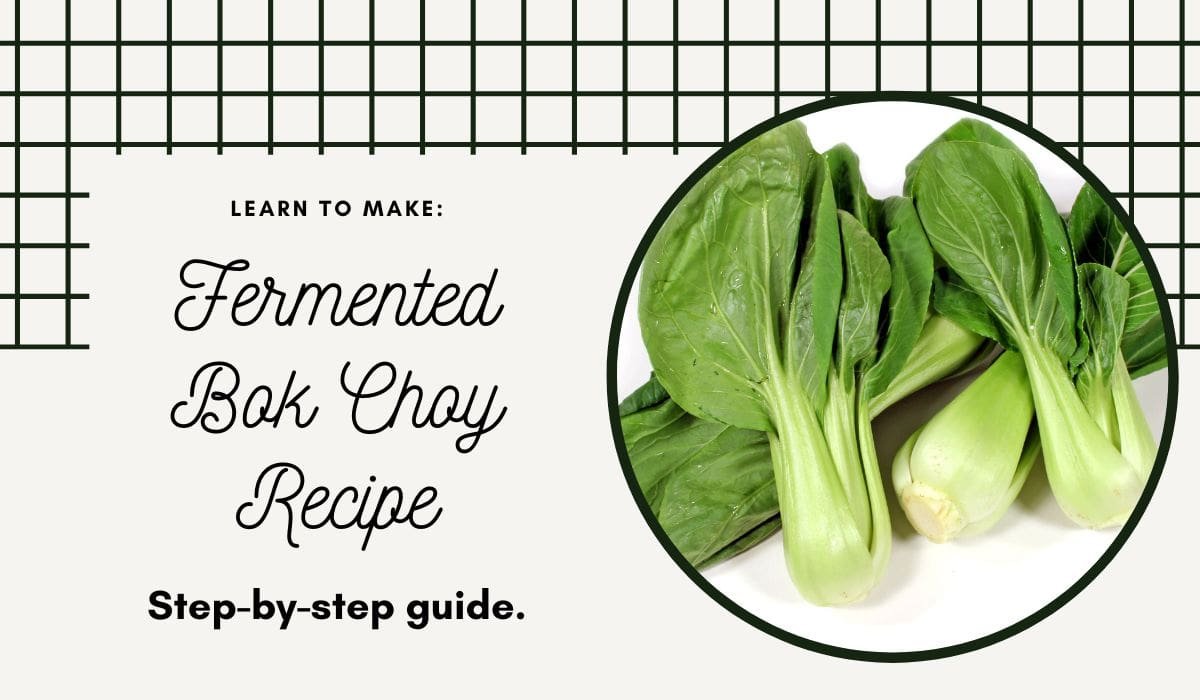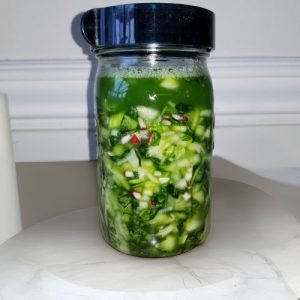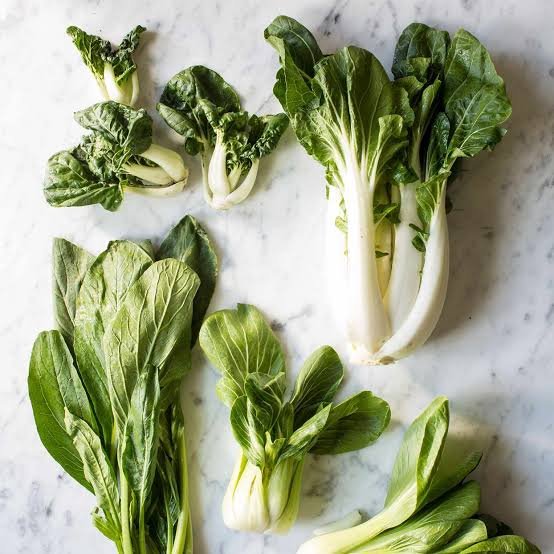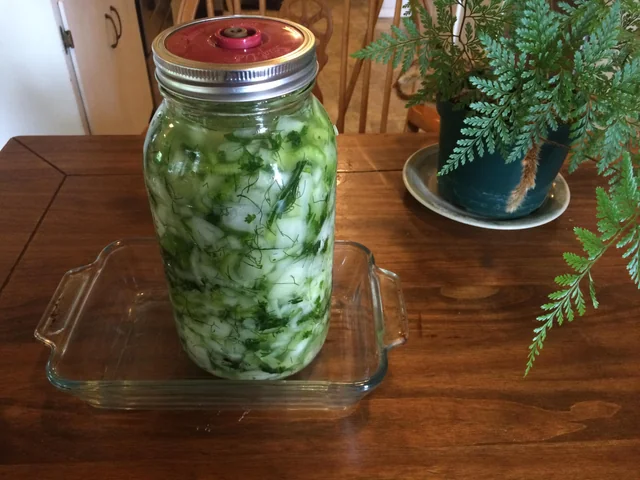How To Make Fermented Bok Choy Recipe

Did you know that fermented foods like Bok Choy are a powerhouse of probiotics? If you’re here, you’re probably looking to add some of these beneficial bacteria to your diet.
But, making fermented Bok Choy at home might seem daunting.
Don’t worry!
In this article, we’ll walk you through the simple steps of making your own fermented bok choy recipe, so you can enjoy all the flavors and benefits it has to offer.
Let’s get started!

Fermented Bok Choy Recipe
Equipment
- 1 quart glass jar
- 1 Fermentation airlock lid (optional)
- 2 Bowls
- 1 Knife
Ingredients
- 400 grams Baby Bok Choy
- 1 tsp Dried Basil
- 2 slices Lemon
- 20 grams Sea Salt Unrefined
- 400 grams Water Filtered
- 1/4 cup Sliced Green Cabbage Leaves Optional
- 2 cloves Garlic Optional
Instructions
- Wash the bok choy and cut it into quarters.
- Cut the garlic into slices
- In a bowl, mix the bok choy, dried basil, lemon slices, and optional green cabbage leaves and garlic.
- Dissolve the sea salt in filtered water to create a brine.
- Place the bok choy mixture in a clean glass jar. Press the mixture down with your fist. Pour the brine over it, ensuring the vegetables are fully submerged.
- Seal the jar and let it ferment at room temperature for 3-7 days, depending on your preference.
- Once the desired level of fermentation is reached, store the jar in the refrigerator.
Notes
- Ensure all equipment and the jar are clean to prevent contamination.
- Check the bok choy during fermentation to release any built-up gases.
- The flavor will develop further as the bok choy continues to ferment in the refrigerator.
- The fermented recipe can be kept in the fridge for up to 2 months.
What are some common mistakes to avoid when storing fermented bok choy?
Here are some common mistakes to avoid when storing fermented bok choy:
- You should always start with fresh bok choy. The leaves should be firm and crisp with bright white bottoms and vivid green tops. Avoid bok choy which has yellowed on the green leaf.
- Not using a clean glass jar: Use a clean glass jar to store the fermented bok choy and ensure that the bok choy is fully submerged in the brine to maintain its quality.
- Not burping the jar during fermentation: Burp the jar during the first few days of fermentation to release built-up gases.
- Not consuming within the recommended time frame: Fermented bok choy should be consumed within 2-3 weeks for the best taste and quality.
- Avoid storing it at room temperature. To keep your Bok Choy fresh and crisp before fermenting, store it in the fridge in a bowl of cold, filtered water.
By avoiding these common mistakes, you can ensure that your fermented bok choy stays fresh and flavorful for an extended period.
What is Bok Choy?

Bok Choy, also known as pak choi or pok choi, is a type of Chinese cabbage. Unlike some other cabbage varieties, it does not form heads. Instead, it has green leaf blades with lighter bulbous bottoms, forming a cluster reminiscent of mustard greens. [1]
The flavor of Bok Choy is slightly sweeter than spinach and water chestnuts, with a mildly peppery undertone. The green leaves have a stronger flavor than the white bulb. It’s a popular vegetable in southern China, East Asia, and Southeast Asia, and is increasingly grown in Northern Europe. [1]
Nutritionally, Bok Choy is very beneficial. It is rich in vitamins, minerals, and antioxidants. It contains vitamins C and Vitamin K, and also offers some fiber, an important nutrient for overall health. It’s been studied for its potential anticancer properties, which appear to come from its sulfur-containing compounds, called glucosinolates.
Bok Choy can be prepared in various ways, including stir-frying, grilling, and roasting. [1]
What Are Fermented Bok Choy’s Benefits?

Fermented Bok Choy offers numerous health benefits:
- Rich in Probiotics: Fermented Bok Choy is loaded with beneficial, gut-health-promoting Lactobacillus bacteria.
- Anti-Cancer Properties: Bok Choy and other cruciferous vegetables have certain anti-cancer properties. Studies have shown that some people who eat more cruciferous vegetables have a lower risk of developing lung, prostate, and colon cancer.
- Rich in Antioxidants: Bok Choy contains vitamin C, vitamin E, and beta-carotene. These nutrients have powerful antioxidant properties that help protect cells against damage by free radicals.
- Bone Health: The iron, phosphorous, calcium, magnesium, zinc, and vitamin K in Bok Choy all contribute to building and maintaining bone structure and strength.
- Blood Pressure: Potassium, calcium, and magnesium are all present in Bok Choy. They can help decrease blood pressure naturally.
Remember, the benefits can vary depending on the exact ingredients used and the fermentation process. Always consult with a healthcare professional before making any major changes to your diet.
Bottom Line
Fermenting Bok Choy not only enhances its flavor but also boosts its nutritional value. This recipe is a simple and delicious way to incorporate this nutritious vegetable into your diet.
Whether you’re new to fermentation or an experienced pro, this fermented Bok Choy recipe is sure to become a staple in your kitchen.
Enjoy the tangy, crunchy goodness of this fermented delight and reap the health benefits it offers. Happy fermenting!
Check More Recipes
